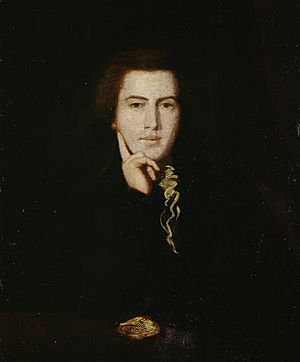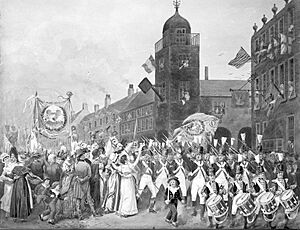William Drennan facts for kids
Quick facts for kids
William Drennan
|
|
|---|---|

Drennan c. 1790
|
|
| Born | 23 May 1754 Belfast, Ireland
|
| Died | February 5, 1820 (aged 65) Belfast, Ireland
|
| Education | University of Glasgow, University of Edinburgh |
| Occupation | Obstetrician |
|
Notable work
|
Letter to his Excellency Earl Fitzwilliam (1795), Wake of William Orr (1797) |
| Movement | Society of United Irishmen |
William Drennan (born May 23, 1754 – died February 5, 1820) was an Irish doctor and writer. He helped create the Society of United Irishmen in Belfast and Dublin. This group wanted to unite all Irish people, no matter their religion, to achieve a fair government.
Drennan was also active in the Irish Volunteer movement. He became well-known for speaking out for "Catholic emancipation", which meant giving Catholics equal rights. After the 1798 Irish Rebellion was put down, he kept working for democratic changes through his writing and by helping with education. He co-founded the Royal Belfast Academical Institution, a famous school in Belfast. As a poet, he is remembered for his poem When Erin First Rose (1795), which gave Ireland the nickname "Emerald Isle".
Contents
Early Life and Education
William Drennan was born in Belfast, Ireland, in 1754. His father, Reverend Thomas Drennan, was a minister. William was one of only three of his eleven brothers and sisters who lived past infancy. His older sister, Martha, was also very influential in his life.
Like his father, Drennan studied at the University of Glasgow in Scotland. This university was a center for new ideas during the Scottish Enlightenment. He learned about freedom and the right of people to stand up against unfair rulers. He believed that people had a right to choose their own government.
After Glasgow, Drennan studied medicine in Edinburgh. He learned from famous doctors and chemists. In 1778, he returned to Belfast and became a doctor, specializing in helping women give birth. He also worked at a poor house and suggested using an early form of vaccination to prevent smallpox.
In 1783, Drennan moved to Newry, and then to Dublin in 1789. In Dublin, he quickly became involved in politics, inspired by news of the French Revolution.
Fighting for Democracy
The Volunteers and Early Writings
Drennan, like many Ulster Presbyterians, supported the American colonists in their fight for independence from Britain. He joined the Volunteers, a group that started to protect Ireland but soon began demanding more rights for Irish people. In 1782, the Volunteers helped Ireland gain more independence from London.
Drennan became well-known in 1784 and 1785 when he published his Letters of Orellana. In these letters, he called for Irish Protestants and Catholics to unite. He believed that if they worked together, they could gain more power and make the Irish parliament fairer.
Founding the United Irishmen
In 1791, as the French Revolution inspired many, Drennan suggested creating a "Brotherhood" in Ireland. This group would work to unite people of all backgrounds and religions. Their goal was to achieve true independence for Ireland and a republican government, where the people held power.
In October 1791, this group officially formed in Belfast, calling themselves the Society of the United Irishmen. They wanted full rights for Catholics and fair representation for everyone in parliament. The Society grew quickly, spreading across Ireland.
At the first meeting in Dublin in November 1791, Drennan wrote a special promise, or "test," that every member had to take. It said they would work for a fair parliament and a "brotherhood of affection" among all Irish people, no matter their religion.
Some people, like William Bruce, a minister in Belfast, worried that Drennan's ideas meant everyone, including Catholics, would have the right to vote. Bruce thought this would give Catholics too much power. Drennan argued that times had changed, and Catholics were ready for political freedom.
In 1793, Drennan was arrested for speaking out against the government. He was suspected of writing a call to arms for the Volunteers. However, he was successfully defended in court and found not guilty in 1794.
Supporting Women's Rights
Drennan had a close relationship with his sister, Martha McTier, who was also interested in new ideas about freedom and equality. She read many radical writers of the time, including those who supported women's rights.
When someone criticized Drennan's idea of "impartial representation" by saying it would mean "every woman" should have equal voting rights, Drennan didn't disagree. He said it might take "some generations" for society to accept that women should have the same rights as men. But he believed that until then, "neither women nor reason should have their full and proper influence in the world." This showed he was ahead of his time in thinking about women's roles in society.
Views on the French Revolution
Drennan and his sister had different views on the violence of the French Revolution. When news of the massacres in Paris reached them, Drennan felt that sometimes harsh actions were necessary to save a revolution. However, his sister was "quite turned against the French" and worried the revolution was going badly.
Drennan also worried about how the French Revolution's anti-religious stance would affect Catholics in Ireland. He believed that Catholics were more focused on their religion than politics, while Presbyterians were the opposite. He thought this difference could cause problems for uniting Irish people.
Working for Change After the Rebellion
Belfast Academical Institution
In 1800, Drennan married Sarah Swanwick. In 1806, he moved back to Belfast and stopped practicing medicine. He decided to work for change more slowly, focusing on education.
He led a group of people in Belfast to create a new school. They wanted to make education more affordable and available to everyone, including middle and lower-class families, and both boys and girls.
The school, called the Royal Belfast Academical Institution, opened in 1814. It was open to all religions. Drennan believed in a new way of teaching, where discipline came from good examples rather than physical punishment. He was inspired by a teacher named David Manson, who taught children without using a rod and made learning fun.
The government was suspicious of the new school because some of its founders were former United Irishmen. They worried it would encourage democratic ideas. Despite some challenges, the school continued to grow and became very important for education in Belfast.
Belfast Monthly Magazine
In 1807, Drennan helped start the Belfast Monthly Magazine. This magazine aimed to explain political issues in a fair way. Drennan wrote articles, biographies, and book reviews for it.
The magazine often discussed the need for better education, freedom of the press, and ending the slave trade. But Drennan's main concerns were still getting equal rights for Catholics and reforming parliament. He also criticized the war with France.
Religion and the State
Drennan believed that religious matters should be a personal choice, not controlled by the government. He thought that true Christianity was about conscience, not strict rules. He wanted to see "the Sovereignty of the People" and "the ascendancy of Christianity, not of any Church." He was against any government support for churches, whether for Presbyterians or Catholics.
Catholic Political Groups
Drennan still worried about Catholics forming their own separate political groups. He believed that Catholics and Protestants should work together to achieve parliamentary reform. He suggested creating "Emancipation Clubs" where both Catholics and Protestants could meet and lead together. His main goal was always to unite all Irish people to achieve a fairer government.
Views on the Union
When the Acts of Union 1800 abolished the Irish Parliament and joined Ireland with Great Britain, Drennan was initially very upset. He urged Irish people to stand together and "maintain their country." He felt that the failure to achieve Irish independence was a great disappointment.
However, later he seemed to accept that the new United Kingdom Parliament might eventually bring about the reforms he wanted. He continued to criticize how the Union was passed and managed, but he did not join calls to bring back the Irish Parliament. He believed that reformers in Ireland and Britain should work together for parliamentary reform.
Literary Works
In his later years, Drennan published two books of poetry, Fugitive Pieces (1815) and Glendalough and Other Poems (1815). He also translated a Greek play called Electra.
His poem Wake of William Orr (1797), written for a United Irishman who was executed, was very powerful. It described Ireland as a "hapless land!" that was "Crumbled by a foreign weight: And, by worse, domestic hate."
His poem When Erin First Rose (1795) is famous for giving Ireland the nickname "Emerald Isle."
Death and Legacy
Drennan died in Belfast in 1820. His funeral followed his wishes: six poor Protestants and six poor Catholics carried his coffin, and a priest and a Protestant minister were present. On the way to the graveyard, his funeral procession stopped briefly outside the Royal Belfast Academical Institution, the school he helped found. His headstone reads:
Pure, just, benign: thus filial love would trace The virtues hallowing this narrow space The Emerald Isle may grant a wider claim And link the Patriot with his Country's name
Family Life
William Drennan and Sarah Swanwick had one daughter and four sons who survived. His sons, John Swanwick Drennan and William Drennan, later wrote a biography about him. Through his daughter Sarah, Drennan has several notable descendants, including:
- William Drennan Andrews, a judge
- Sir James Andrews, 1st Baronet, a chief judge in Northern Ireland
- J. M. Andrews, a Prime Minister of Northern Ireland
- Thomas Andrews, who was a managing director at the Harland and Wolff shipyard, famous for building the Titanic.
Writings and Publications
- A letter to Edmund Burke (1780)
- An Address to the Volunteers of Ireland by the Author of an address to Edmund Burke (1781)
- Letters of Orellana, an Irish Helot (1785)
- Letter to his Excellency Earl Fitzwilliam (1795)
- Letter to the Right Honorable William Pitt (1799)
- Second letter to the Right Honorable William Pitt (1799)
- A Protest from one of the people of Ireland against a union with Great Britain (1800)
- Letter to the Right Honorable Charles James Fox (1806)
- Fugitive pieces in verse and prose (1815)
- A Courteous Reply to the Remarks of Presbyter Relative to the Belfast Academical Institution (1816)
 | May Edward Chinn |
 | Rebecca Cole |
 | Alexa Canady |
 | Dorothy Lavinia Brown |


